Flips, fundraising and misconceptions about men’s gymnastics
Juggling extracurriculars, academics and social life is challenging for any college student. But when injuries, fundraising and national competition are on the line, club sports athletes like the members of ASU men’s gymnastics are doing a balancing act on and off the mat.
In 1993 the ASU men’s gymnastics team shifted from being an NCAA sport to a club team. Since then, the team tried out several different types of fundraising before landing on floor moves. These are gymnastics meets that the teams set up; the events fund 80% of the team’s expenses.
Unfortunately, the gymnasts had scheduled several floor moves before shelter-in-place orders were issued, and the team lost a projected $110,000. This isn’t the team’s first experience with setbacks, though, and they know how to persist. Cambry Del Valle, Kiwan Watts, JP Voyles, Victor Vasquez and Vinnie Colosimo gave ASU Student Life a glimpse of what college life is like as a club gymnast and what inspires them as athletes.
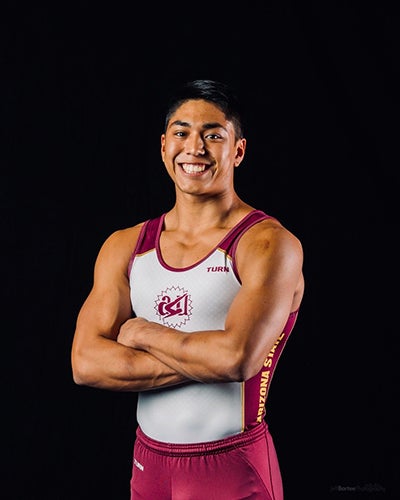
ASU gymnast Victor Vasquez
Question: What major are you?
Del Valle: I’m a sophomore and my major is technological entrepreneurship.
Watts: I’m a junior and my major is construction management and a minor in Japanese.
Voyles: I switched my major my sophomore year from graphic information to exercise. So, I pretty much had to restart.
Vasquez: Film and media production
Colosimo: Computer science
Q: Out of the six events (floor, rings, pommel horse, vault, parallel bars and high bar) which ones do you do?
Vasquez: I used to do four, but then after my surgery, I do one. I'm trying to see what I can do; I do one mainly right now and that's just pommel horse.
Colosimo: So the last two years, I’ve only trained the vault, floor and parallel bars, but I've recently started training all six because I want to be an all-rounder next year.
Voyles: Prior to my accident I did floor, vault, parallel bars and high bar. My senior year I did floor and in my fifth year I did vault and floor.
Del Valle: Kiwan is an all-around gymnast, meaning he does all six events. But for me, I don't do all six events. I specialize. So I only do I would say rings and pommel horse.
Q: What are floor moves? How do those work?
Del Valle: Throughout our season there’ll be weekends where our coach will have us go set up competitions throughout Arizona, in Tucson, sometimes Phoenix and all over the place. But yeah, that’s how we raise money. We’ll set up competitions, tear them down. We do almost an absurd amount of fund raising for the team, but it’s understable. You could have a floor move at 9 o’clock when you have homework and stuff to do at 12 that night. But it's just something you got to figure out. You have to plan ahead. You have to do work beforehand. You just have to plan things out accordingly in order to just not stress yourself out later and run into problems like that. But it could be a lot sometimes with school and practice; it'll get you tired.
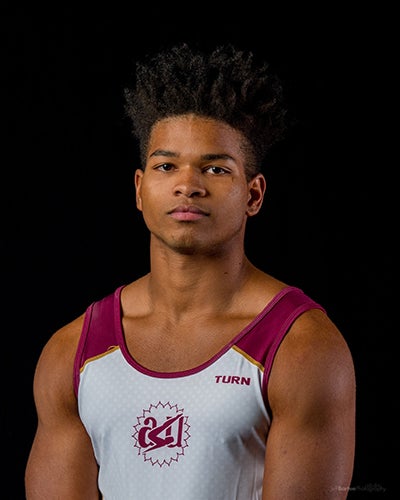
ASU gymnast Cambry Del Valle
Colosimo: We individually get points, and our points are a representation of how much you're doing outside of the gym for the team. How many points you have gets taken into consideration when the coaches are choosing who they want to put on line-up, because, if someone’s really good but they’re not doing any floor moves or anything like that to help benefit the team, then obviously they don’t deserve to compete. It keeps everyone engaged in helping the team and then also at the end of the year the top 10 guys with the most points get a cash reward.
Q: What are your most cherished experiences?
Del Valle: I want to say I think it was pretty recent actually last year, going to nationals for the first time and the IGCs [International Gymnastics Camp], I want to say that was a great experience because it’s my first time in a really big collegiate meet and I had made finals for the pommel horse line-up, which was surprising to me. I didn’t think I would be able to do that. So that was a shock.
And I hit my set and I just went out there and did my job, and I wasn't very confident months leading up to that competition. I was kind of nervous and I was talking with my head coach and he wanted me to compete at that meet. He said, if you try really hard, you come in and show your sets, do what you need to do, I’m going to put you on that line-up. I was just working really hard trying to make that line-up competition. And I did it. And that was an awesome moment for me to finally compete there.
Voyles: My last year we went to Sacramento, California. We drove for six hours, six to eight hours to Sacramento. Fifteen stanky guys huddled in one van. The day after the competition that they were leaving, we all went to the beach. And we were pretty much just hanging out as a team. There was no, “we should go do this, we should go do that.”
It was just us together. We were all peaceful and content just relaxing there. One of the freshmen at the time, Mason, asked me the same question as you. “What's your favorite part of the team?”
I said I think it would have to be Sacramento because I don't think I felt more at home with a random group of people than like I feel at home with my own family.
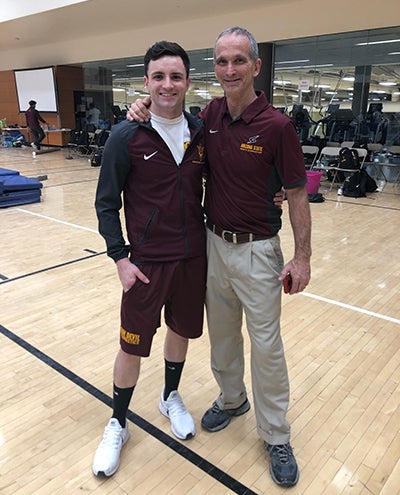
ASU gymnast JP Voyles (left) with Head Coach Scott Barclay
Q: What have been some of the challenging experiences have you had in gymnastics?
Voyles: September 3, 2017. I fell off a cliff during one of our team camping trips. And I was air vacced from the cliff side, and it was probably one of the biggest things I've ever faced because not only my team had my back. You know, they got ahold of my parents, they got my car back to my house after the accident because I couldn't drive. I was in a hospital for a week.
One of the most challenging things was, I think, having to sit on the sidelines my senior year and watch my teammates train while I couldn’t do anything. And I think it was maybe two or three months after my accident, I started playing around a little bit, doing a little bit of tumbling. But I can only do it with one arm. I think that was probably the most challenging because there are definitely times where I got just so frustrated. I was like, this is not how I wanted it to go. And I didn’t think it would work. But I actually got to go to nationals in Fort Worth, Texas, and I got around seven or ninth. I only did one event that year. That’s challenging but one of the most rewarding experiences in my life and on the team. There were many others, but that was the icing on the cake.
Del Valle: Junior year of high school, I broke my ankle before the season started. Usually we consider junior year one of your most important years to getting on your college team. Because a lot of colleges are looking at you at competitions and stuff. Junior year, I was really trying to push myself and get looked at by colleges, but that happened because of my broken bone and I took a lot to come back from because it was super discouraging. But I kept a positive mindset. I stayed in the gym. I would keep working out with the team and just trying to make myself better. So that when I would return, I would be ready for my senior year.
Watts: I had surgery on my right shoulder before [Olympic] trials in 2016. It kind of put me in like a depression. Once I started moving around, getting out of the house and using my arm again, I was a little more motivated than what I was before. But it took a while, you know. I had to take baby steps, do physical therapy and then I had to get in the gym. I tried to do simple stuff like push-ups and all that stuff. After that, I felt a lot better. I felt a lot more motivated to get the job done.
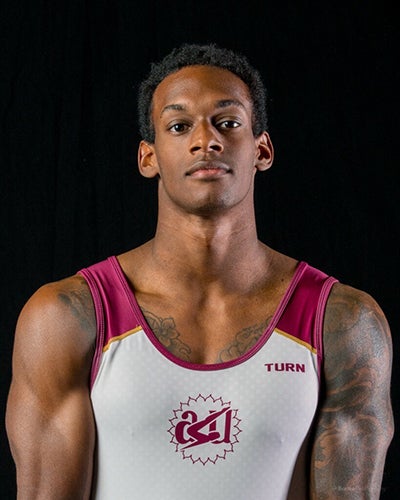
ASU gymnast Kiwan Watts
Q: What common misconceptions have you heard about your sport?
Del Valle: It's just a pure lack of knowledge on the sport. Nine out of 10 times, if you ask somebody, “What are some gymnastics events?” They’re not going to know any events that you’re talking about. It’s just a diverse, different sport that not a lot of people know about. But if I were to say some misconceptions, I guess people might think, oh, it’s just backflips and cartwheels and swinging around. I get that type of vibe from people.
Q: Would you recommend this sport for everyone?
Watts: It’s definitely not a normal person sport. You got to be mentally and physically ready. Being a gymnast shapes you a lot like having to deal with injuries, you learn time management just cause you’re most likely doing goal practice and then other stuff. So it is a challenge. But at the end of the day, you’ve got to be very thankful for all the skills in all that stuff that you’ve learned throughout the years of being a gymnast. It’s pretty beneficial, especially the way you hold yourself is very important, too.
Vasquez: The strength training can be used for soccer or football or basketball. It’s just a great introductory sport for kids at any age. But I guess you want to be serious about the sport. You need to be patient and understand that it’s going to be more losses than it is for your triumphs because this sport really humbles you. It’s a slow progression. You make your body do things it shouldn’t be doing, you know? It’s crazy. If you want a challenge, I highly recommend you do this. But don’t be discouraged if you’re not as good as someone else, because everyone’s different.
Q: Has gymnastics taught you any life skills?
Del Valle: Definitely time management was I would say a big part of something that I learned throughout my being at ASU, especially my freshman year. I remember my time management definitely was not the greatest. With just being new in college gymnastics, college classes, making friends, pretty sure I was probably missing some homework assignments, showing up late to practice or whatnot. But later I realized how to get better at time management. And it really started with simple things like getting more sleep, eating the right things, because once you start doing stuff like that, you start to think clearly.
Q: What are your wildest dreams regarding gymnastics?
Del Valle: I would just finish out the college season strong, just get as many skills as I can and improve myself as much as I can. See how far I’ve come from my freshman year to my senior year. Being proud of that journey and accomplishment is what I’m looking forward to.
Colosimo: To one day compete at Winter Cup, which is a really big meet that is hosted in Vegas, and I’ve been going to that meet since I was 8 years old. All the younger guys get to go and compete at it. But only the best of the best get to compete at the high-level competition. It’s kind of like trials for the Olympics, too. If you do really well there, you have a good shot at the Olympics. Just to, one day, compete there would be insane.
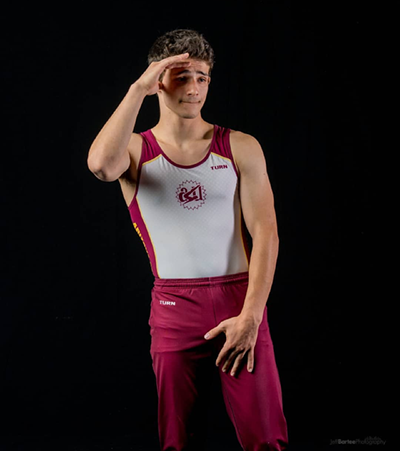
ASU gymnast Vinnie Colosimo
Watts: I have a couple, so my dreams are making the senior national U.S. team and being able to compete at World University Games, which is like a world championships for college athletes. The biggest dream was to go to the Olympics.
Vasquez: When I was growing up there, my one goal was to compete at a Winter Cup. But I’m running out of time. Right now, I’m just trying to enjoy the sport. Have fun with my last remaining years in gymnastics. And how I understand the sport now, I want to use that to raise other gymnasts. I want to coach sometime in my life. Raise a group of kids from elementary school throughout high school. That’ll be awesome.
Voyles: Since I’m retired, I don’t compete anymore. I would love to be able to watch gymnastics on TV like any other sport. I think like Kiwan and Cambry said, it’s not very well known and unfortunately it is a dying sport that, you know, people are fighting to keep alive and to give up-and-coming gymnasts this opportunity to compete at a collegiate level. I would truly love to be able to turn the TV on, flip it over to ESPN and watch a gymnastics meet.
Learn more about ASU Men’s Gymnastics team.